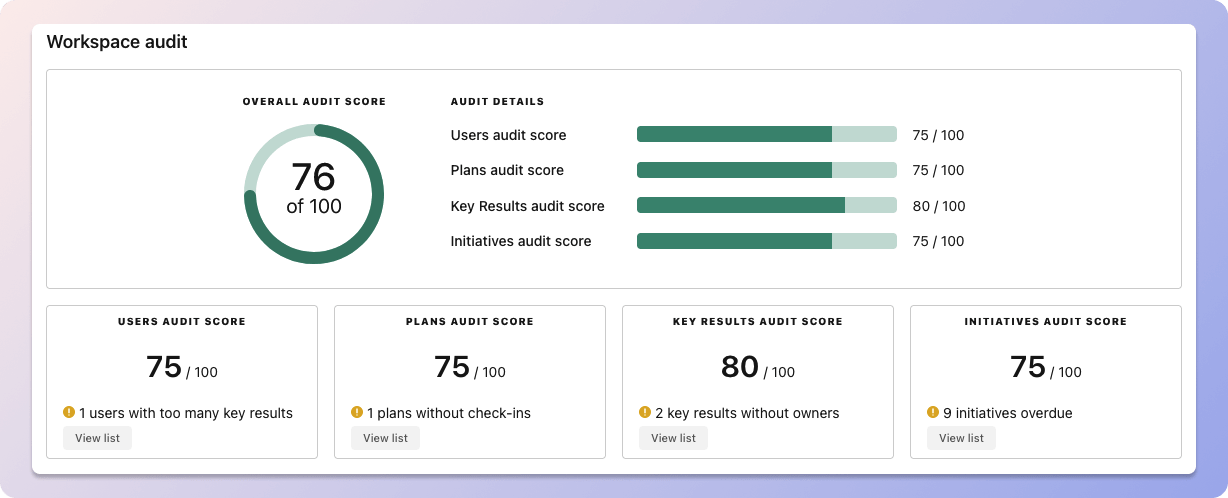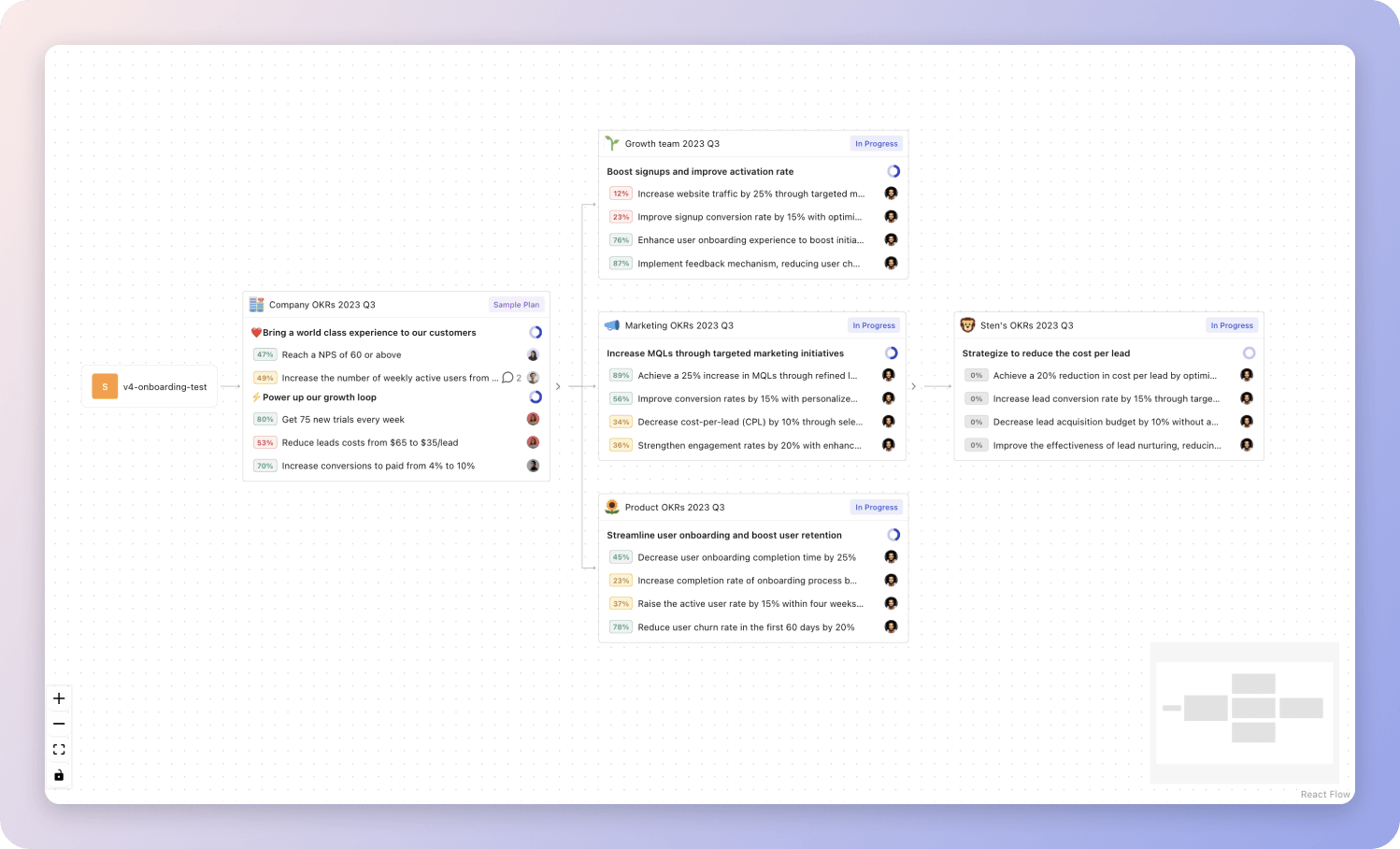6 OKR examples for Project Teams
What are Project Teams OKRs?
The Objective and Key Results (OKR) framework is a simple goal-setting methodology that was introduced at Intel by Andy Grove in the 70s. It became popular after John Doerr introduced it to Google in the 90s, and it's now used by teams of all sizes to set and track ambitious goals at scale.
Creating impactful OKRs can be a daunting task, especially for newcomers. Shifting your focus from projects to outcomes is key to successful planning.
We've tailored a list of OKRs examples for Project Teams to help you. You can look at any of the templates below to get some inspiration for your own goals.
If you want to learn more about the framework, you can read more about the OKR meaning online.
Best practices for managing your Project Teams OKRs
Generally speaking, your objectives should be ambitious yet achievable, and your key results should be measurable and time-bound (using the SMART framework can be helpful). It is also recommended to list strategic initiatives under your key results, as it'll help you avoid the common mistake of listing projects in your KRs.
Here are a couple of best practices extracted from our OKR implementation guide 👇
Tip #1: Limit the number of key results
Having too many OKRs is the #1 mistake that teams make when adopting the framework. The problem with tracking too many competing goals is that it will be hard for your team to know what really matters.
We recommend having 3-4 objectives, and 3-4 key results per objective. A platform like Tability can run audits on your data to help you identify the plans that have too many goals.
 Tability's audit dashboard will highlight opportunities to improve OKRs
Tability's audit dashboard will highlight opportunities to improve OKRsTip #2: Commit to the weekly check-ins
Setting good goals can be challenging, but without regular check-ins, your team will struggle to make progress. We recommend that you track your OKRs weekly to get the full benefits from the framework.
Being able to see trends for your key results will also keep yourself honest.
 Tability's check-ins will save you hours and increase transparency
Tability's check-ins will save you hours and increase transparencyTip #3: No more than 2 yellow statuses in a row
Yes, this is another tip for goal-tracking instead of goal-setting (but you'll get plenty of OKR examples below). But, once you have your goals defined, it will be your ability to keep the right sense of urgency that will make the difference.
As a rule of thumb, it's best to avoid having more than 2 yellow/at risk statuses in a row.
Make a call on the 3rd update. You should be either back on track, or off track. This sounds harsh but it's the best way to signal risks early enough to fix things.
Building your own Project Teams OKRs with AI
While we have some examples below, it's likely that you'll have specific scenarios that aren't covered here. There are 2 options available to you.
- Use our free OKRs generator
- Use Tability, a complete platform to set and track OKRs and initiatives
- including a GPT-4 powered goal generator
Best way to track your Project Teams OKRs
Quarterly OKRs should have weekly updates to get all the benefits from the framework. Reviewing progress periodically has several advantages:
- It brings the goals back to the top of the mind
- It will highlight poorly set OKRs
- It will surface execution risks
- It improves transparency and accountability
Spreadsheets are enough to get started. Then, once you need to scale you can use a proper OKR platform to make things easier.
 Tability's Strategy Map makes it easy to see all your org's OKRs
Tability's Strategy Map makes it easy to see all your org's OKRsIf you're not yet set on a tool, you can check out the 5 best OKR tracking templates guide to find the best way to monitor progress during the quarter.
Project Teams OKRs templates
We've covered most of the things that you need to know about setting good OKRs and tracking them effectively. It's now time to give you a series of templates that you can use for inspiration!
We've added many examples of Project Teams Objectives and Key Results, but we did not stop there. Understanding the difference between OKRs and projects is important, so we also added examples of strategic initiatives that relate to the OKRs.
Hope you'll find this helpful!
OKRs to increase project engagement for delivery excellence
Increase project engagement for delivery excellence
Provide training for 100% of project teams
Identify necessary skills for each project team
Schedule and conduct training sessions
Develop comprehensive training programs accordingly
Implement feedback loop to continuously improve project delivery
Develop a system for gathering and consolidating feedback
Establish a routine for regular project status updates and review
Implement changes based on feedback and review effectiveness
Increase project adoption of systems by 20%
Encourage feedback about the system for improvements
Train team members on functionalities and benefits of the system
Integrate system use into routine project processes
OKRs to enhance collaboration and performance in the marketing team
Enhance collaboration and performance in the marketing team
Increase the number of joint projects by 50% to promote collaboration
Follow-up aggressively on project proposals until closure
Identify potential partners for collaboration in shared fields
Propose joint-venture ideas to potential partner organizations
Improve overall project efficiency by 30% through streamlined team processes
Implement a robust project management software for better task tracking
Conduct workshops to enhance team collaboration and communication skills
Regularly review and refine team processes to boost productivity
Implement fortnightly team-building activities to enhance cooperation by 20%
Schedule bi-weekly team-building sessions within work hours
Monitor and measure cooperation progress post-activity
Identify engaging team-building activities suitable for all team members
OKRs to achieve promotion to software engineer 3
Achieve promotion to software engineer 3
Complete advanced software development certification
Mentor and provide guidance to junior software engineers
Schedule regular one-on-one meetings to discuss progress, challenges, and career goals
Offer constructive feedback and actionable suggestions for improvement on their code
Actively involve them in meaningful projects to gain real-world experience and build confidence
Provide resources and recommend learning opportunities to enhance their technical skills
Receive positive performance reviews from team members and supervisors
Regularly check in with team members and supervisors to receive feedback and updates
Actively listen to team members and supervisors, and address any concerns or suggestions
Set clear and measurable goals with team members and supervisors
Continuously improve skills and knowledge through training and professional development opportunities
Deliver three high-impact software projects successfully
Implement effective project management methodologies to ensure efficient coordination and communication
Define clear project goals, timelines, and deliverables for each software project
Assemble a skilled and dedicated team with the necessary expertise for each project
Regularly monitor and evaluate progress, making adjustments as needed to meet project objectives
OKRs to enhance cross-functional collaboration in team
Enhance cross-functional collaboration in team
Increase the team's cross-functional skills by 30% by offering relevant training
Identify necessary cross-functional skills for team improvement
Implement regular skill development trainings
Find suitable training programs for these skills
Conduct minimum 3 team-building activities promoting inter-department collaboration each week
Identify suitable inter-department team-building activities
Schedule these activities for each week
Ensure each department's participation
Reduce project completion time by 15% through improving cross-functional performance
Implement collaborative software for seamless cross-functional communication
Streamline workflows across different departments
Provide training to improve cross-functional teamwork
OKRs to enhance Developer Quality
Enhance Developer Quality
Foster collaboration by establishing cross-functional teams to deliver one successful project
Clearly define the roles and responsibilities of each team member to ensure clarity
Facilitate regular communication and meetings among team members to encourage collaboration
Identify key individuals from different departments to form cross-functional teams
Provide the necessary resources and support to enable teams to successfully deliver the project
Enhance technical skills through monthly training sessions with at least 90% attendance
Monitor and track attendance of each team member for training sessions
Provide relevant and informative training materials for each session
Communicate the importance of attending training sessions to all team members
Establish a monthly schedule for training sessions
Increase code quality by implementing code review process and achieving an average rating of 4 out of 5
Establish a designated code review team to review and provide constructive feedback on code submissions
Implement a systematic code review process and ensure all code changes undergo thorough review
Define clear coding guidelines and standards to be followed during the code review process
Regularly measure and track the code review ratings, identifying areas of improvement and addressing them
Improve efficiency by decreasing average bug fix time to less than 24 hours
OKRs to improve QA progress tracking across all projects
Improve QA progress tracking across all projects
Implement a standardized QA progress tracking system across all projects
Train all project teams on how to use the new tracking system
Roll out the standardized QA progress tracking system across all projects
Regularly monitor and update the tracking system to ensure accuracy and effectiveness
Develop a comprehensive QA progress tracking template
Increase the percentage of completed QA tasks by 15% compared to the previous quarter
Regularly communicate progress and expectations to the QA team for accountability
Implement a standardized QA checklist to ensure completeness and accuracy
Implement a peer review process to catch any missed QA tasks
Provide additional training and resources to enhance QA team's skills
Conduct weekly meetings to review and update QA progress and address any bottlenecks
Identify and resolve bottlenecks in the QA process during each weekly meeting
Schedule weekly QA progress meetings to review and update project status
Document meeting discussions and actions taken to keep track of progress
Assign action items to team members for addressing any identified bottlenecks
Reduce the average time taken to complete QA tasks by 10%
More Project Teams OKR templates
We have more templates to help you draft your team goals and OKRs.
OKRs to drive Agile Culture and Continuous Improvement
OKRs to enhance sales team performance to achieve set KPIs
OKRs to secure guest posts for enhanced brand visibility and thought leadership
OKRs to improve Arbor's inclusivity
OKRs to successfully launch MVP of X new website to the public
OKRs to increase revenue efficiency across all business units
OKRs resources
Here are a list of resources to help you adopt the Objectives and Key Results framework.
- To learn: Complete 2024 OKR cheat sheet
- Blog posts: ODT Blog
- Success metrics: KPIs examples